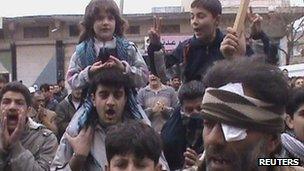Syria crisis: Obama rejects US military intervention
- Published
President Barack Obama has described the situation in Syria as "heartbreaking" but said that unilateral US military intervention there would be a mistake.
Mr Obama said President Bashar al-Assad would fall, as other dictators had fallen, but the US would try to achieve this by working to isolate Syria.
More deadly clashes were reported across Syria on Tuesday.
The international community remains divided on how to end violence there.
The UN says more than 7,500 people have died as a result of the violence in Syria over the past 12 months.
McCain's call
In his first news conference of 2012, Mr Obama warned his critics not to forget the cost of war.
He rejected a comparison to Libya, saying Syria was more complicated.
In Libya, where rebels backed by Nato air strikes ousted longtime leader Col Muammar Gaddafi after an uprising lasting several months, the US had "the full co-operation of the region," the president said.

Activists claimed 35 people were killed in Syria on Tuesday
"The notion that the way to solve every one of these problems is to deploy our military, that hasn't been true in the past, and it won't be true now," said Mr Obama.
"We've got to think through what we do through the lens of what's going to be effective - but also through what's critical for US security interests."
On Monday, US Senator John McCain - Mr Obama's opponent in the 2008 presidential election - called for US air strikes against Syrian forces.
Syrian security forces continued shelling rebel-held towns on Tuesday, activists said, as President Assad vowed to continue fighting "terrorism".
A boy and five soldiers were reportedly killed as troops launched an assault on the southern town of Herak, a base of the Free Syrian Army (FSA).
Aid kept out
The Local Co-ordination Committees (LCC), a network of Syrian activists, said 35 people were killed by security forces across Syria on Tuesday.
Twenty-three people died in Homs, it said, including 13 members of two families, who were allegedly killed with knives by security forces personnel and pro-government militiamen in the Baba Amr district.
The International Committee of the Red Cross (ICRC) and the Syrian Red Crescent are still being prevented from entering Baba Amr.
The UN refugee agency (UNHCR) has said that more than 1,500 people, mostly women and children from in and around Homs, have crossed the border into Lebanon to escape the violence.
The UN humanitarian chief Valerie Amos is due to arrive in Damascus on Wednesday.
She said her aim was to "urge all sides to allow unhindered access for humanitarian relief workers so they can evacuate the wounded and deliver essential supplies".
The United States says it is proposing a new UN Security Council resolution on Syria.
Ambassadors from the five permanent members of the council held talks at UN headquarters on Tuesday, along with Morocco, representing Arab countries.
Russia and China have vetoed two previous resolutions, saying they were unbalanced and only demanded the government stop attacks.
Russia has made it clear that its position on Syria has not changed since Vladimir Putin was re-elected as president at the weekend.